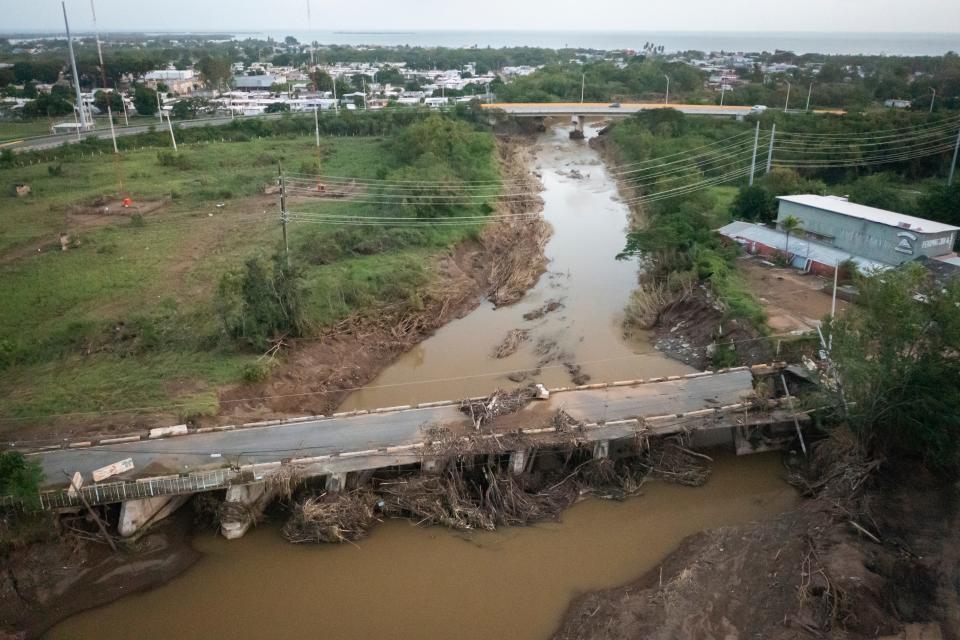After Hurricane Fiona, will Puerto Rico ever become a state or an independent nation?
For the second time in five years, devastating infrastructure failure in Puerto Rico after a hurricane has raised the question of governmental status of the Caribbean island, a U.S. territory whose residents can’t vote for president or for voting members of Congress.
More than 1 million customers remained without electricity, and nearly half of a major water authority's customers lacked running water in the aftermath of Hurricane Fiona. The island's fragile power grid and infrastructure result from a lack of political power because of inadequate governmental representation, critics say.
This year, House Democrats introduced a bill that would give Puerto Rico residents, who are U.S. citizens, a self-determination vote. Proposed changes include statehood or independence.
What is Puerto Rico's governmental status?
Puerto Rico, acquired by the United States from Spain in 1898 after the Spanish-American War, is a commonwealth, or self-governing state, subject to the authority of Congress. Residents can vote in presidential primaries but not the general election. The island has a nonvoting member of Congress but no voting representatives or senators, as states have.
In contrast, residents of Washington, D.C., which also has been mentioned as a candidate for statehood, have no voting members of Congress but do get to vote for president. The district has three electoral votes.
Puerto Rico has given its residents the opportunity to express their opinion on the island's governmental status, holding various nonbinding votes on its relationship to the United States. In a 2020 ballot measure that asked a single question about statehood, 52.3% of voters said they favored Puerto Rico becoming a state. In three earlier nonbinding plebiscites between 1967 and 1998, a majority of Puerto Rican voters favored remaining as a commonwealth. Other residents favored outright independence.
Reminder of Maria: 5 years later, Puerto Ricans are still struggling with Hurricane Maria's devastation. Then came Hurricane Fiona.
Hurricane wreaks damage: Bermuda faces risk of strong waves, damaging winds as Hurricane Fiona intensifies
Aid needed: Puerto Rico governor requests major disaster declaration; Fiona grows stronger

What does it mean for Puerto Rico to not be a state?
Puerto Ricans are still dealing with the repercussions of powerful Hurricane Maria, which ravaged the island five years ago this week. That has aggravated Hurricane Fiona recovery and provides a fresh reminder of Puerto Rico's disadvantages under the current governmental system, according to those favoring a change in status.
The island's failed power grid "has become the poster child of the decay of the colonial system, its institutions and a very vulnerable population," said Cecilio Ortiz García, co-founder of the University of Puerto Rico’s National Institute of Energy and Island Sustainability.
The federal response after Maria was considered slow compared with aid provided after similar disasters in U.S. states, according to critics.
Jenniffer Gonzalez-Colon, Puerto Rico's nonvoting congressional representative and an advocate for statehood, sees "a direct connection" between Puerto Rico's governmental status and its frayed infrastructure.
"Puerto Rico, as a territory of the United States, needs to comply with a lot of federal laws. But we do not receive the same resources as a state," she told NPR. "And that means that this economic situation on the island, where you have a 47% of poverty rate, it's higher than any other state. Once Puerto Rico become a state, that will allow the island to normalize our economy, like it happened with Hawaii and with Alaska many, many years ago."
What is being done to try to change Puerto Rico's status?
During the current session of Congress, representatives and senators have introduced bills that would give Puerto Rico an opportunity to reconsider its status with the U.S. At least one House bill, introduced last year, would grant Puerto Rico statehood.
Puerto Rican legislators and its governor, Pedro Pierluisi, a Democrat, were in Washington last week pushing Congress to pass the Puerto Rico Status Act, which calls for a binding 2023 vote by residents of Puerto Rico on the island's status.

“It is time to end colonialism within America. It is time to end the territorial relationship of Puerto Rico with the United States,” Pierluisi said in Washington.
What is the likelihood that Puerto Rico's status will change?
Gonzalez-Colon, a Republican, expresses high hope for congressional approval of the self-determination bill, citing passage by a congressional committee and the support of some Republicans. But, in the face of history and current opposition, it faces a high bar.
The question of statehood for Puerto Rico highlights significant party divisions. Granting statehood to Puerto Rico and Washington, D.C. – both expected to lean Democratic politically — has been advocated by some Democratic activists as a means of balancing what is considered a Republican structural advantage in the Senate and the Electoral College.
Many Republicans oppose statehood, with some saying it is a Democratic ploy to increase the party's power in Congress. Sen. Mitch McConnell, R-Ky., the Senate GOP leader, said in 2020 that Puerto Rican statehood wouldn't happen if he were the Senate majority leader.
Possibility of statehood? Could DC, Puerto Rico become the next US states? Here's what Congress is considering
And, in a 2020 interview, then-U.S. Sen. Martha McSally, a Republican from Arizona, laid out GOP concerns: "They're going to make D.C. and Puerto Rico a state and get four new Democrat senators. We'd never get the Senate back again."
Contributing: Amanda Pérez Pintado, Grace Hauck, Adrianna Rodriguez and Chelsey Cox, USA TODAY
This article originally appeared on USA TODAY: Will Puerto Rico ever become a state? Hurricane Fiona renews debate

